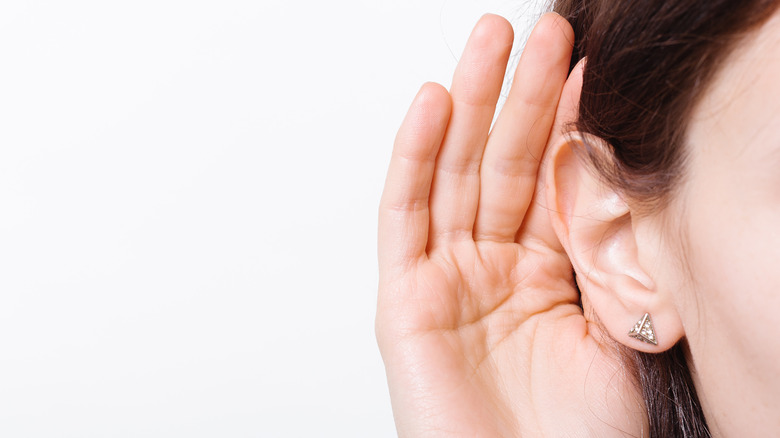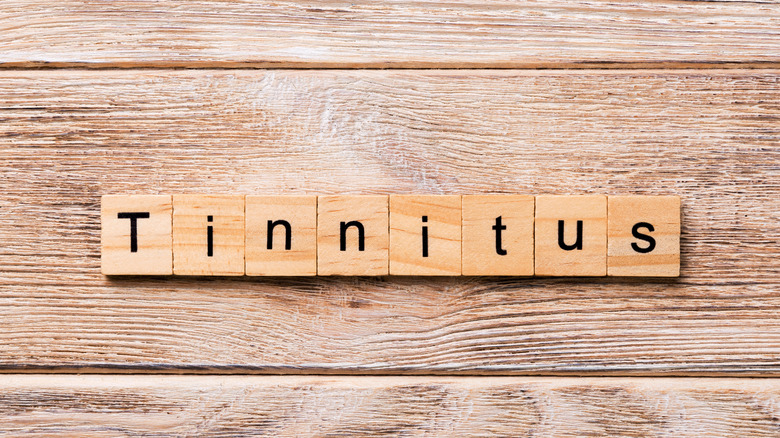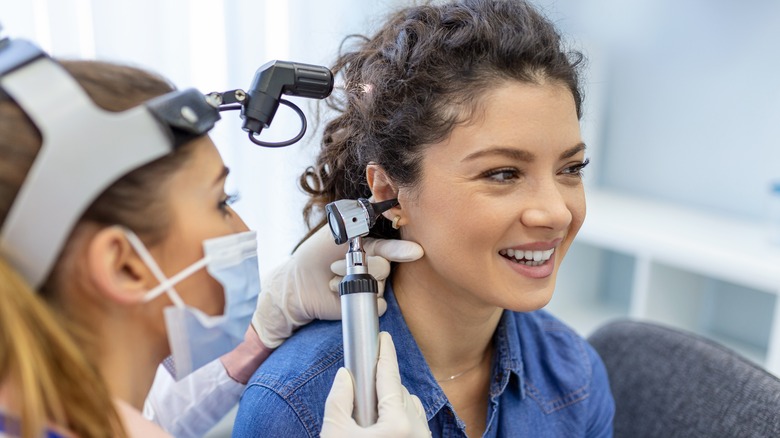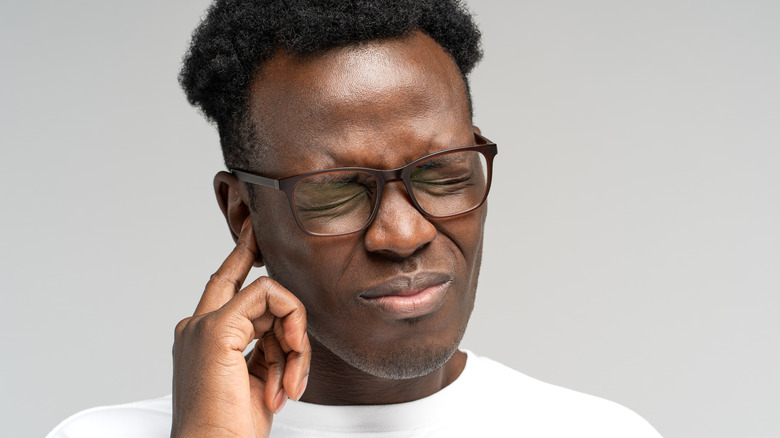Tinnitus Explained: Causes, Symptoms, And Treatments
People with tinnitus hear noises that are not from an external source. Tinnitus is commonly referred to as "ringing in the ears," but it you could hear other kinds of sounds, according to the American Tinnitus Association (ATA). Almost everyone sometimes hears transient ear noises, which typically last for seconds and are not serious. These transient noises are not tinnitus, states a guide in The Journal of Family Practice. Rather, in order to qualify as tinnitus, someone must experience ear sounds that persist for five or more minutes, and the episodes must occur two times weekly or more.
Hearing noises in your ear might feel strange or even scary, but it's quite common. The National Institute on Deafness and other Communication Disorders (NIDCD) estimates that in the past year, about 25 million adults in the U.S. have experienced tinnitus. A 2022 systematic review published in JAMA Neurology found that tinnitus affects more than 740 million people worldwide, with just over 15% of those considering it a serious issue in their lives.
Unfortunately, nothing can be done to simply switch off the ringing in your ears at will. But tinnitus can go away spontaneously, or if its cause is found and treated. There are also ways to manage and cope with tinnitus. Learning about tinnitus is an empowering step in the right direction.
What does tinnitus sound like?
There are many sounds heard by people with tinnitus, including the stereotypical "ringing" (via the British Tinnitus Association). The noise may also be heard as a hum, whoosh, or buzz. According to News Medical, some people also compare their tinnitus to sounds found in nature (insects, flowing water) or industrial noises (chainsaws, engines). Tinnitus can vary in pitch and consistency — the noises might be high- or low-pitched, heard sporadically or consistently, and they may pulse or remain steady (via ENT health). People with tinnitus may feel like the sounds they hear come from within their heads or from far away (per Harvard Health Publishing).
Although tinnitus is heard by the ears, in most cases it's an illusion created by the brain, according to the NIDCD. Scientists haven't found out why this happens, but tinnitus is likely due to a defect in the communication between the ear and the part of the brain responsible for interpreting sounds. UpToDate notes that sometimes the tinnitus persists even if the defect that initially caused it heals. Also, tinnitus can be the result of actual sounds produced by the body (via MSD Manual).
Types of tinnitus
Tinnitus is usually characterized as either subjective or objective. If you have subjective tinnitus, it means that no one else can hear the noises in your ear. This is the case for most tinnitus sufferers. Objective tinnitus means someone else can hear your tinnitus sounds. This is because your ear picks up sounds produced by structures around it, and it's possible for someone else to hear these sounds (via MSD Manuals).
There are other ways tinnitus can be described. Tinnitus might be called pulsatile if it has the same rhythm with your heartbeat. If It does not follow your heart's rhythm, it is non-pulsatile. if you hear sounds in both ears, as is the case for many people, your tinnitus is bilateral. if tinnitus is heard in one ear, it is unilateral (via The Journal of Family Practice). According to the American Speech-Language-Hearing Association (ASHA), tinnitus is seen as a secondary problem if an underlying cause is found. It is otherwise considered a primary issue if nothing apart from hearing loss is linked to it. Depending on the extent to which it affects your wellbeing, tinnitus can be bothersome or non-bothersome. Tinnitus can be an acute or chronic problem. Acute tinnitus typically goes away after a while. Chronic tinnitus persists for longer than three months (per Hearing Health Foundation). Some people have an intermittent tinnitus which comes and goes, while others have a continuous tinnitus where they constantly hear sounds (via MSD Manuals).
What causes tinnitus?
There could be many reasons why your ears are ringing. It's also possible for tinnitus to be idiopathic, which means it has no identifiable cause (via News Medical). According to WebMD, exposure to loud noises is the most common cause of tinnitus. This could be from loud social events or noisy machines. You could get tinnitus after being exposed to loud sounds just once, or from years of continuous exposure. Loud noises may lead to acute tinnitus, says the British Tinnitus Association. Tinnitus from loud noises could also be chronic, especially if it's associated with hearing loss.
Healthline notes that tinnitus can be caused by some medications which are described as ototoxic. These medications not only cause tinnitus, they could poison the ear and impair hearing. Aspirin, when taken in large doses, can be ototoxic. Other ototoxic drugs include loop diuretics like bumetanide, aminoglycoside antibiotics like gentamicin, chloroquine for malaria, and cancer chemotherapy drugs like vincristine. According to ASHA, exposure to loud noises while taking these drugs increases your chance of getting tinnitus. Aminoglycoside antibiotics and cancer chemotherapy drugs usually lead to chronic tinnitus. Aspirin, chloroquine, and loop diuretics usually cause acute tinnitus that goes away when you stop taking them. The site emphasizes that ototoxic drugs are only given after a doctor has weighed the consequences against the benefits of using them, and patients need to be observed and given hearing tests regularly if these drugs must be used.
Tinnitus is associated with some medical conditions
According to the Cleveland Clinic, tinnitus is a symptom of about three quarters of all conditions affecting the ear. These include presbycusis (age-related hearing loss), otosclerosis (rare growths in the middle ear), an acoustic neuroma (a non-cancerous tumor of inner ear nerves), Ménière's Disease, or temporomandibular joint disorders. You may also develop tinnitus as a result of excessive earwax that blocks your ear, objects that are stuck in your ear, or when your eustachian tube gets congested because of allergies.
Pulsatile tinnitus is often the outcome of a problem with blood flow in vessels within the neck. This might be caused by artery blockages, anemia, or hypertension that isn't well-regulated. Pulsatile tinnitus (usually in one ear) can come from blood flow within glomus tumors in the ear, but these tumors are rare. Pulsatile tinnitus could also originate from abnormally connected blood vessels around the ear. Non-pulsatile objective tinnitus is associated with spasms of muscles in the middle ear caused by a head injury or conditions such as multiple sclerosis (via MSD Manuals).
Tinnitus may come from other conditions that don't directly affect the ear. WebMD states that tinnitus has been linked to low vitamin levels, lupus, rheumatoid arthritis, hormonal changes, and diabetes. Some people have experienced tinnitus after getting COVID-19. It's not clear why this happens, but it's probably due to inflammation of the inner ear caused by infection with the virus, says Healthline.
How a doctor diagnoses tinnitus
Tinnitus diagnosis starts with taking an extensive history, states this review published in the Australian Journal of General Practice. You'll be asked when your tinnitus started and if you've used any medications or had been exposed to loud noise around the time that symptoms began. Your doctor will want to know if your tinnitus is heard in one ear or if you experience ear pain, vertigo, or drainage from your ears. You'll be assessed for stress, anxiety, depression, or sleep problems, which are associated with tinnitus.
Your physician will also ask you to describe the sounds you hear, as this can help them to identify what may have caused the tinnitus. According to the Mayo Clinic, a high-pitched ringing is the most common tinnitus sound and may be caused by loud noises, hearing loss, medication use, or an acoustic neuroma. A low-pitched ringing may indicate a blocked ear, otosclerosis, or Meniere's disease. Clicking sounds are associated with muscle contractions, and pulsing or rushing sounds with pulsatile tinnitus.
Your doctor might also request some tests or scans depending on the suspected cause of your tinnitus (via News Medical). Hearing and balance tests are done to check the function of the ear. A spinal tap checks if a brain tumor is responsible for tinnitus, and an auditory brainstem response checks nerve connections within the hearing system. MRI and CT scans are used to check the brain, angiography to assess blood vessels, and X-rays to check the joint in the jaw.
Possible negative effects of tinnitus
For some people, tinnitus is not a big problem. For others, it's a source of great distress and disrupts their lives. One 2017 study published in Laryngoscope found that depression and anxiety were higher in tinnitus sufferers compared to the general public — about a quarter of those with tinnitus has one of these mental health issues, compared to about one in 10 people in general. The study also found that on average tinnitus sufferers were absent from work nearly twice as often than non-sufferers, and lost an equivalent of about one full night's sleep each month.
According to News Medical, the brain will keep noticing your tinnitus sound, especially if it's consistent and chronic. This may not give the brain time to relax and may lead to insomnia, restlessness, irritability, fatigue, mental, and physical exhaustion. The Mayo Clinic adds that on the extreme side, tinnitus sufferers may have trouble concentrating, face communication challenges, and even experience suicidal ideation. Some people with tinnitus may develop hyperacusis, which is an increased sensitivity to everyday sounds, per the British Tinnitus Association. They may find regular sounds to be too noisy, intrusive, or even painful to hear.
If you or someone you know needs help with mental health or is having suicidal thoughts, please contact the Crisis Text Line by texting HOME to 741741, call the National Alliance on Mental Illness helpline at 1-800-950-NAMI (6264), visit the National Institute of Mental Health website, or call the National Suicide Prevention Lifeline by dialing 988 or by calling 1-800-273-TALK (8255).
Some things worsen tinnitus
If you've had tinnitus for a while, you may have noticed that your tinnitus is worse or louder on some days and quieter or less bothersome on other days. There are some things that make tinnitus worse, and these are unique to each tinnitus sufferer. You can observe what worsens your tinnitus and steer clear of these triggers.
For instance, one 2015 study published in the American Journal of Audiology found that for some folks sounds could worsen tinnitus — but being in a quiet environment was also often said to exacerbate symptoms. Stress and insufficient sleep were commonly reported triggers as well. Interestingly, some participants reported that nothing made their tinnitus worse. The fact that tinnitus is worsened by noise for some people means that sound therapy might not be effective for them, suggests the authors.
Some people find that their tinnitus is worsened by certain foods and caffeine, per the British Tinnitus Association. The site adds that tinnitus can be worsened by alcohol and tobacco use. Seasonal allergies, a cold, excessive earwax, or ototoxic drugs may also worsen tinnitus (via Arizona Hearing).
Tips to mask tinnitus
Currently, there is no cure for tinnitus (per the Mayo Clinic). And in many cases, the cause of tinnitus can't be found. So many people have to live with a chronic ringing in the ear. If you are one of these people, there are some simple things you can do to mask tinnitus.
Background noise from a white noise machine, humidifier, or dishwasher may be beneficial, says Penn Medicine. But you should avoid loud noises, or wear earplugs if you can't avoid them. They advise that you sleep with your head slightly elevated to reduce congestion and lessen tinnitus noises. ENT Health adds that you should try not to think about tinnitus, as this can make tinnitus sound louder. The ATA advises that you carry on with your usual social activities and hobbies, as these distract you from the sound while isolation can make tinnitus worse. They add that exercising can be good for you as it helps you cope with tinnitus, improves your emotional health, and reduces stress.
How is tinnitus treated?
Tinnitus treatments address any underlying causes or aim to ease symptoms and their negative impacts (via WebMD). Hearing aids are prescribed for tinnitus caused by hearing loss. Your earwax will be flushed or sucked out if it's excessive. Ear drops and antibiotics are used to treat ear infections. Dental therapy is usually required for people with temporomandibular joint (TMJ) disorders. And surgery might be necessary for otosclerosis, a tumor, or cyst, but these are rare conditions.
Tinnitus retraining therapy is widely used and it eases tinnitus discomfort in 80% of patients (via UpToDate). It involves conditioning the brain to accept tinnitus sounds as natural and not something you should find irritating. This is achieved through counseling and wearing a sound-emitting device. Some tinnitus sufferers benefit from tinnitus maskers or notch therapy (via Ear Guru). These therapies use devices worn like hearing aids. Tinnitus maskers drown out the noise, while notch therapy relegates the noise to the background and makes the brain less sensitive to it.
According to the ATA, there are currently no medications for tinnitus approved by the Food and Drug Administration (FDA). But drugs can be used to treat stress, anxiety, and depression associated with tinnitus. Behavioral therapies like cognitive behavioral therapy and its variant, tinnitus activities treatment can help, along with mindfulness-based stress reduction and acceptance and commitment therapy. If you need to get treated for tinnitus, you can find a professional on the ATA's repository.
Natural remedies for tinnitus
According to Management of Tinnitus, many tinnitus sufferers, upon learning that their condition has no cure, seek complementary or alternative remedies. Although these remedies improve the lives of tinnitus sufferers, they do not get rid of the condition. The author also stresses that these remedies need to be performed or taught by experienced professionals to be effective. Hypnotherapy as well as some acupuncture techniques have been used to manage tinnitus by making individuals less disturbed by the noises. Some other remedies include biofeedback, which involves learning how to control the body's responses, and aromatherapy, which makes use of essential oils and massage for symptom relief.
Additionally, WebMD suggests that relaxation techniques like meditation, yoga, tai chi, self-hypnosis, guided imagery, and progressive muscle relaxation can reduce the stress and anxiety brought by tinnitus. There are nutritional supplements marketed as tinnitus treatments. These supplements usually contain ginkgo biloba, vitamin B12, or zinc, but Healthline notes that supplements are not FDA approved, and their effectiveness to help with tinnitus is not backed by current scientific data.
Smart technologies for tinnitus
A 2021 review published in Frontiers in Digital Health remarked on just how much better technology has made tinnitus management. Initially, computers were only used to input and process information on tinnitus patients. Now there are curated tinnitus masking and notching playlists, sophisticated hearing aids, hearables (wearable ear devices with wireless connectivity), tinnitus apps, and smart devices that help track how you respond to tinnitus. The authors of the review predict that scientists will take advantage of technologies like biosensors, artificial intelligence, augmented reality, or virtual reality for more precise and individualized tinnitus therapies.
For now, tinnitus apps and web-based therapies are the most accessible smart therapies. There are several apps for tinnitus, and many more will likely be developed. However, 75% of tinnitus sufferers in one study were not even aware that tinnitus apps exist. And these apps are pretty useful. According to the study's analysis, services like sound therapy, meditation and mindfulness, hypnosis, relaxation exercises, tinnitus assessment, or tinnitus education are provided by tinnitus apps. You can find some of these apps on the ATA's website. Web-based cognitive behavioral therapy and acceptance and commitment therapy are available in self-help or moderated formats as well, per this 2018 review published in Frontiers in Neuroscience.
Will tinnitus go away?
For some people, tinnitus goes away after a short while even without any treatment (via Hear Again America). If the cause of tinnitus, such as hearing loss or excessive earwax, is determined and treated, tinnitus will likely go away. And tinnitus that comes and goes (intermittent tinnitus) will likely stop coming back eventually. But it's also possible for tinnitus to last for years. Hear Again America notes that the longer tinnitus lasts, the higher the chances that it will be a chronic, lifelong condition.
While permanent tinnitus surely sounds daunting, one 2021 study published in Scientific Reports found that chronic tinnitus becomes more bearable over time. Most participants reported that the loudness and sounds of tinnitus did not change but were less troublesome, uncomfortable, and annoying. This is known as tinnitus habituation — becoming used to tinnitus, and thus finding it less noticeable and intrusive. According to the British Tinnitus Association, this habituation process will help allow you to still enjoy your regular activities.
When to worry about tinnitus
Most tinnitus cases are harmless. But if you suspect that you have tinnitus (or if you've had it for a while), you should meet with your doctor for proper diagnosis and treatment (via MSD Manuals). There are some symptoms you should be particularly worried about, such as tinnitus in one ear, pulsatile tinnitus, hearing loss, dizziness, vertigo (if your surroundings are spinning), unbearable tinnitus, facial paralysis, or a bad-smelling ear discharge (via Healthline, Harvard Health Publishing, WebMD).
These symptoms may indicate that there's an underlying condition that requires medical treatment. Tinnitus in one ear, dizziness, vertigo, and ear fullness are signs of Ménière's
disease, an inner ear condition (via NIDCD). Hearing loss and tinnitus in one ear, facial paralysis, loss of balance, dizziness, and vertigo are symptoms of an acoustic neuroma, a slow-growing, noncancerous tumor in the inner ear (via Mayo Clinic). Sudden hearing loss in one ear, tinnitus, balance problems, and dizziness are signs of sudden deafness (via Healthline). Pulsatile tinnitus, hearing loss, difficulty swallowing, a racing heart, headache, and dizziness are signs of a glomus tumor, a benign tumor found in the skull or neck (via Duke Health).














